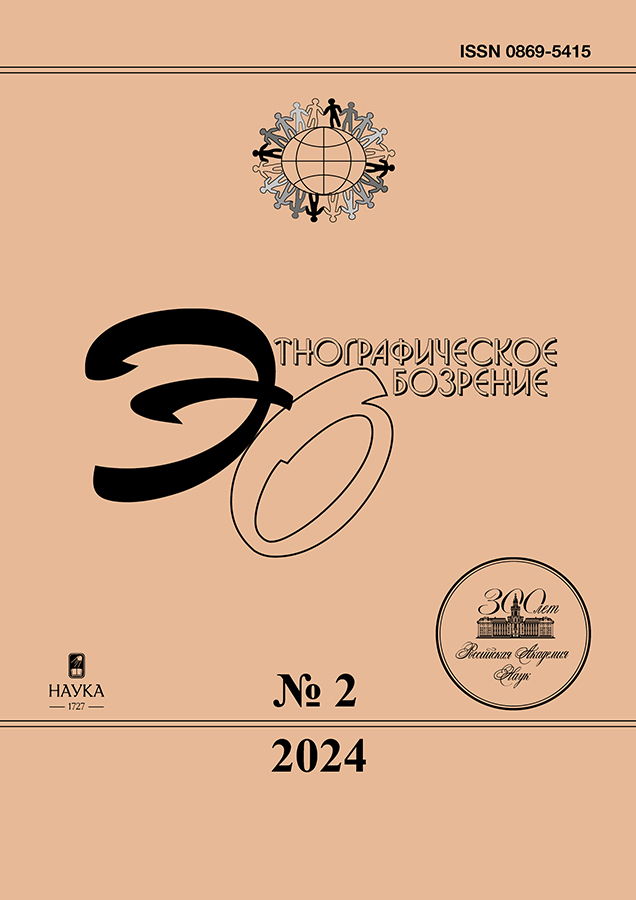Reciprocity and patron-clientelism as forms of an institution of mutual assistance network in villages of the Republic of Tatarstan
- Авторлар: Sagdieva E.А.1
-
Мекемелер:
- Marjani Institute of History of Tatarstan Academy of Sciences
- Шығарылым: № 2 (2024)
- Беттер: 229-246
- Бөлім: Research Articles
- URL: https://permmedjournal.ru/0869-5415/article/view/672570
- DOI: https://doi.org/10.31857/S0869541524020129
- EDN: https://elibrary.ru/CJVTKZ
- ID: 672570
Дәйексөз келтіру
Аннотация
The sustainability of the rural world of the Republic of Tatarstan today largely depends on the development and functioning of the institution of network mutual assistance. I attempt to study the situation, making use of network theories in sociology as well as concepts of reciprocal and patron-client relationships as key aspects in the reproduction of mutual assistance networks. Drawing on field interviews collected in various villages of Tatarstan, I examine the actors and practices of mutual assistance in reciprocal and patron-client rural relationships and argue for the necessity of further support and development of mutual assistance networks in rural areas as a way of securing collective mutual insurance in an unstable economic situation.
Толық мәтін
Авторлар туралы
Elvina Sagdieva
Marjani Institute of History of Tatarstan Academy of Sciences
Хат алмасуға жауапты Автор.
Email: elvina_n@inbox.ru
к. соц. н., старший научный сотрудник отдела этнологических исследований
Ресей, 7А Baturina St., Kazan, 420111Әдебиет тізімі
- Barsukova, S.Y. 2004. Neformal’naiia ekonomika [Informal Economy]. Moscow: GU VShE.
- Burt, R. 1992. Structural Holes: The Social Structure of Competition. Cambridge, Mass: Harvard University Press.
- Dementiev, V.E., S.G. Evsiukov, and E.V. Ustiuzhanina. 2019. Otnosheniia retsiproknosti na formiruiushchihsia rynkah setevyh blag [Reciprocity Relations in Emerging Markets of Network Goods]. Terra Economicus 17 (4): 23–40. https://doi.org/10.23683/2073-6606-2019-17-4-23-40
- Fadeeva, O. 1999. Mezhsemeinaia set’: mekhanizmy vzaimopodderzhki v rossiiskom sele [The Inter-Family Network: Mutual Support Mechanisms in the Russian Countryside]. In Neformal’naia ekonomika. Rossiia i mir [The Informal Economy: Russia and the World], edited by T. Shanin, 183–218. Moscow: Logos.
- Fodoria, A.Y. 2005. Sotsial’nyi institut vzaimopomoshchi i ego evoliutsiia v protsesse modernizatsii model’nykh etnosov [The Social Institute of Mutual Assistance and Its Evolution in thePprocess of Modernization of Model Ethnic Groups]. Moscow: Moskovskii gosudarstvennyi universitet servisa.
- Fodoria, A.Y. 2016. Sotsial’naya solidarnost’ kak konceptual’naia osnova izucheniia instituta vzaimopomoshchi v zarubezhnoi sotsiologii i sotscial’noi antropologii XIX–XX vekov [Social Solidarity as a Conceptual Basis for Studying the Institute of Mutual Assistance in Foreign Sociology and Social Anthropology of the 19–20 Centuries]. In Osobennosti sotsial’noi solidarnosti v sovremennom rossiiskom obshchestve: materialy mezhvuzovskoi nauchno-prakticheskoi konferentsii [Features of Social Solidarity in Modern Russian Society: Materials of the Interuniversity Scientific and Practical Conference, Moscow, March 25–26], edited by A.V. Tkachenko, 156–167. Moscow: Pero.
- Fomashin, V.S. 2020. Daroobmen kak osnova sotsial’nogo vzaimodeistviia [Gift Exchange as the Basis of Social Interaction]. Gumanitarnyi vestnik 3 (83). http://dx.doi.org/10.18698/2306-8477-2020-3-667
- Gabdrakhmanova, G.F. 2016. Ob osobennostiakh etnicheskoi identichnosti tatar [About the Peculiarities of the Ethnic Identity of the Tatars]. Istoricheskaia etnologiia 1 (1): 27–38.
- Gabdrakhmanova, G.F. 2021. Smysly i praktiki povsednevnogo trudovogo povedeniia sel’skikh russkikh i tatar [Meanings and Practices of Everyday Labor Behavior of Rural Russians and Tatars]. EKO 2 (51): 85–103. https://doi.org/10.30680/ESO0131-7652-2021-2-85-103
- Gradoselskaia, G.V. 2004. Setevye izmereniia v sotsiologii: uchebnoe posobie [Network Measurements in Sociology: A Textbook], edited by G.S. Batygina. Moscow: Novyi uchebnik.
- Granovetter, M. 2009. Sila slabykh sviazei [The Strength of Weak Ties]. Ekonomicheskaia sotsiologiia 10 (4): 31–50.
- Kovalev, E.M., ed. 1996. Golosa krest’ian: sel’skaia Rossiia XX veka v krest’ianskikh memuarakh [Peasant Voices: Rural Russia of the 20 Century in Peasant Memoirs]. Moscow: Aspekt Press.
- Maltseva, D.V. 2018. Setevoi podhod kak fenomen sotsiologicheskoi teorii [Network Approach as a Phenomenon of Sociological Theory]. Sociologicheskie issledovaniia 4: 3–14. https://doi.org/10.7868/S0132162518040013
- Polanyi, K. 2002. Ekonomika kak institutsional’no oformlennyi protsess [Economics as an Institutionalized Process]. Ekonomicheskaia sotsiologiia 3 (2): 62–73.
- Reutov, E.V., M.N. Reutova, and I.V. Shavyrina. 2019. Retsiproknost’ v setiah vzaimopomoshchi (na materialah regional’nogo issledovaniia) [Reciprocity in Mutual Aid Networks (Based on the Materials of a Regional Study)]. Sotsiologicheskie issledovaniia 3: 106–117. https://doi.org/10.31857/S013216250004283-4
- Sahlins, M. 1999. Ekonomika kamennogo veka [The Economics of the Stone Age]. Moscow: OGI.
- Shanin, T. 1999. Ekspoliarnye struktury i neformal’naia ekonomika sovremennoi Rossii [Expolar Structures and the Informal Economy of Modern Russia]. In Neformal’naia ekonomika. Rossiia i mir [The Informal Economy: Russia and the World], edited by T. Shanin, 11–32. Moscow: Logos.
- Shanin, T. 2002. Obychnoe pravo v krest’ianskom soobshchestve [Customary Law in the Peasant Community]. In Kuda idet Rossiia? Formal’nye instituty i real’nye praktiki [Where is Russia Going? Formal Institutions and Real-World Practices], edited by T.I. Zaslavskaya, 267–274. Moscow: Moskovskaia shkola sotsial’nykh i ekonomicheskikh nauk.
- Sharin, V.I. 2021. Osnovy semeinoi vzaimopomoshchi (na primere semei s det’mi – studentami universiteta) [Fundamentals of Family Mutual Assistance (On the Example of Families with University Student Children)]. Vestnik Yuzhno-Ural’skogo gosudarstvennogo universiteta. Seriia, Sotsial’no-gumanitarnye nauki 21 (3): 87–94. https://doi.org/10.14529/ssh210311
- Shevchenko, I.O. 2013. Sotsial’nye seti i praktiki vzaimopomoshchi v sem’iakh s malen’kimi det’mi [Social Networks and Mutual Assistance Practices in Families with Young Children]. Vestnik RGGU. Seriia, Sotsiologicheskie nauki 2 (103): 103–104.
- Shteinberg, I. 1999. Russkoe chudo: lokal’nye i semeinye seti vzaimopodderzhki i ikh transformatsiia [Russian Miracle: Local and Family Mutual Support Networks and Their Transformation]. In Neformal’naia ekonomika. Rossiia i mir [The Informal Economy: Russia and the World], edited by T. Shanin, 207–239. Moscow: Logos.
- Turner, J.H. 1991. The Structure of Sociological Theory. Belmont: Wadsworth Thomson Learning.
- Vlasova, N.V. 2016. Praktiki reprezentatsii etnichnosti v polietnicheskom regione (na materialah Srednego Povolzh’ia) [The Practice of Representation of Ethnicity in a Multiethnic Region (Based on the Materials of the Middle Volga Region)]. Karel’skii nauchnyi zhurnal 5 (4/17): 220–225.
- Zotova, M.V. 2016. Volonterskaia deiatel’nost’ studentov kak sovremennaia forma blagotvoritel’nosti [Student Volunteer Activity as a Modern Form of Charity]. Tsentr innovatsionnykh tekhnologii i sotsial’noi ekspertizy 3 (7). http://ma123.su/load/citiseh_3_7_2016g/13_00_00_pedagogicheskie_nauki/zotova_m_v_volonterskaja_dejatelnost_studentov_kak_sovremennaja_forma_blagotvoritelnosti/44-1-0-274
Қосымша файлдар









